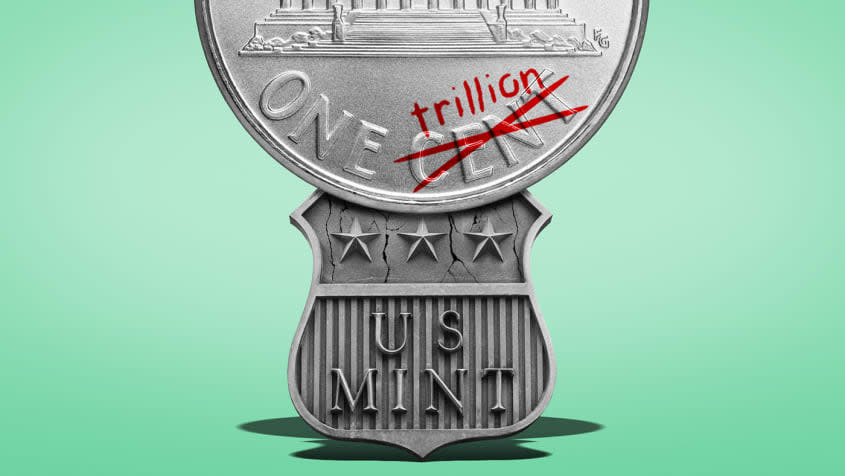The pros and cons of the trillion-dollar coin

The clock is ticking on America's debt ceiling. Treasury Secretary Janet Yellen announced this week that the federal government will "run out of money to pay its bills" if Congress does not raise the debt limit by June 1. With Republicans and Democrats gridlocked over the issue, another option has emerged as a possible-fail safe: The trillion-dollar platinum coin.
The notion has been around for a few decades, and the proposal is exactly what it sounds like: The U.S. Mint would simply "issue a new $1 trillion platinum coin and then use that influx of funds to pay the government's bills," Yahoo Money explains. (The influx would come from depositing the coin with the Federal Reserve.) Voilà! No more debt crisis. Critics dismiss the idea as a cute trick, but advocates say extraordinary measures might be needed to prevent the government from tipping over into default. A trillion-dollar coin? That would be pretty extraordinary. Here are some of the arguments for and against:
Pro: It averts a catastrophic global recession
"U.S. debt is practically the foundation of the global financial system," writes MSNBC's Ryan Cooper. If America defaults on its debt payments, "a major recession is likely." The debt-ceiling crisis puts President Biden in a terrible bind: Congress already passed a budget law that funds the government through September — but by refusing to raise the debt ceiling is denying the Biden Administration the authority to carry out that budget. While the platinum coin admittedly sounds "silly," it also offers Biden a way out of that bind, and averts an economic calamity to boot. "Surely any sane person would choose the option that doesn't cause drastic and utterly pointless harm to the global economy."
Con: It makes today's inflation even worse
"A trillion-dollar coin would cause inflation equivalent to a one-time $3,000 tax on every American," economist Ryan Young writes for National Review. The Federal Reserve already has the ability to create new money and buy federal debt — and created about $5 trillion in new money between 2020 and 2022 to keep the economy afloat during the COVID pandemic: the "trillion-dollar-coin idea, minus the metal." We know what happened next. "The reason it stopped is that it contributed to today's inflation." The platinum coin would create "small price increases on everything" and would hurt working families. Besides, it avoids the real question: "We cannot dodge the need for a clear-headed approach to spending and debt."
Pro: It prioritizes avoiding default
The main criticism of the platinum coin proposal is that it causes inflation, Jason Linkins writes for the New Republic. But "defaulting on the nation's debt would have more immediate and drastic economic consequences than minting a coin and stashing it away." Yes, it is a ridiculous solution to the problem — but the problem is also ridiculous: The debt ceiling is an absurdity that gives the GOP the power to "drag the country to the brink of a debt default, and perhaps even push us over the edge." Minting the coin and using it to pay the country's debts would remove the Republicans' ability to hold fiscal health hostage. It's time to "end the danger once and for all."
Con: It won't necessarily work
The platinum coin might let the U.S. keep paying its bills, Jim Puzzanghera writes for the Boston Globe, but "it would not be without shaking the confidence that helps make the United States the world's dominant economy." A similar debt showdown in 2011 caused Standard & Poor's to downgrade the country's debt rating and raised borrowing costs. A similar confrontation this year will also "roil financial markets," that no "gimmick" like the trillion-dollar coin can prevent. There's no magic trick that can replace a deal between Democrats and Republicans. One expert tells Puzzanghera: "The bottom line is we can issue the $1 trillion dollar coin and still get our debt downgraded."
Pro: It's a straightforward option
The U.S. is facing a debt ceiling crisis "for no good reason at all," writes The Atlantic's Annie Lowrey. "Either Congress will raise the debt ceiling or the full faith and credit of the country will be at risk." The platinum coin idea is odd — it first emerged in the comments section of a blog on monetary policy — but some economists believe it would be "less disruptive" than the disaster that might result from a default on the country's bills. Rohan Grey, a law professor at Willamette University in Oregon suggests to Lowrey that the coin could disrupt the cycle of debt crises that seem to spring up whenever a Republican Congress and a Democratic White House face off against each other. "It's very dangerous to play a game of chicken," Grey says. "It requires two sides to play! If you swerve, there's no game of chicken anymore."
Con: It's a gimmick that could undermine credibility
Yes, Congress gave the Mint the authority to create platinum coins and sell them at a markup, Joel Griffith and Peter St Onge write for the Heritage Foundation. But there's no reason to believe that a law that allows the creation of "souvenir coins" was "intended to give the Mint effective control of the money supply." Such a maneuver would be unprecedented: The Mint has never created "fake denominations for the purpose of funding government operations." Producing the platinum coin would pave the way for higher inflation while concentrating monetary policy in the Biden administration's hands. "Such a concept lies in the realm of banana republics."

